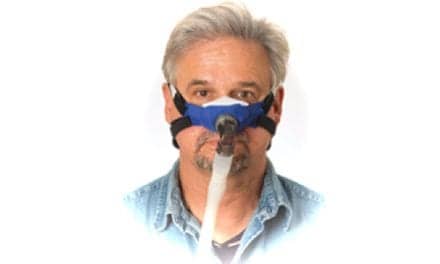Patients who use a self-management app when treating their sleep apnea with positive airway pressure (PAP) are significantly more likely to stick with their therapy, according to results from a large observational study reported by ResMed. Data was presented at the Chest 2016 annual meeting in Los Angeles on October 26.
The observational study included more than 128,000 people with sleep apnea whose devices allow for their therapy to be remotely monitored by their clinician or by the patients themselves via myAir, ResMed’s cognitive behavior–based patient engagement app for the web and iPhone.
More than 87% of PAP users were compliant on therapy when using ResMed’s myAir and monitored by AirView, compared to 70% compliance for those monitored by AirView alone (a 24% relative increase). While CPAP therapy has vastly improved due to innovations in device comfort and ease of use, in general, CPAP adherence may still be as low as 50% without the use of wireless monitoring, ResMed reports.
“This new study shows that online self-monitoring tools engage patients and significantly improve their compliance and adherence to treatment,” said ResMed medical director Adam Benjafield, PhD. “While our study focused on PAP users, we believe these results may be generalized more broadly in terms of the role online tools can have in improving medical treatment compliance overall.”
myAir is available on the web and via an iPhone app to patients using ResMed’s Air10 devices. myAir allows people to track the progress of their therapy between visits to their clinician, including a simple daily sleep score, details on four key treatment metrics and personalized coaching tips.
As a companion to AirView, ResMed’s cloud-based tool for healthcare professionals, myAir reinforces the efforts of clinicians and helps patients keep themselves informed and motivated, factors long considered to play a role in effective treatment of sleep apnea and other medical conditions.
“Half of all patients don’t take their medications as prescribed, and we know that same statistic holds true for compliance with PAP therapy for sleep apnea,” said Benjafield. “The effects of poor treatment adherence are profound, not only for the number of people suffering due to poor medication adherence, but also in terms of emergency room visits, hospitalizations and their financial burden to the healthcare system.”










